What's next after the release of Meng Wanzhou?
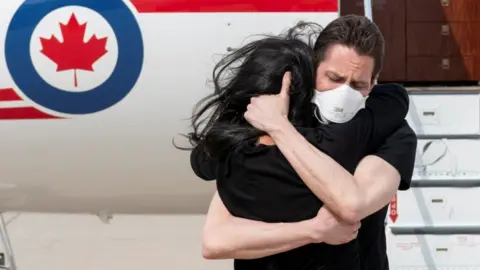 Reuters
ReutersBy the time photographers captured the long embrace shared by Michael Kovrig and his wife, Vina Nadjibulla, on the tarmac of Toronto's Pearson airport one month ago, he had spent over 1,000 days in a concrete cell in China.
It was an emotional reunion because, as Canadians knew, it was no normal homecoming.
Mr Kovrig, along with fellow Canadian Michael Spavor, had become known worldwide as the "Two Michaels".
Their detentions - under the claim that they were spies, which was denied by both - was widely seen as a tit-for-tat by Beijing in response to Canada's arrest of a Chinese businesswoman at the request of US authorities in December 2018.
Meng Wanzhou was no ordinary executive, but the chief financial officer of Huawei, the world's largest telecoms equipment maker and a poster child for the country's tech sector. She is also the daughter of the firm's founder, Ren Zhengfei, who was once a member of the Chinese People's Liberation Army.
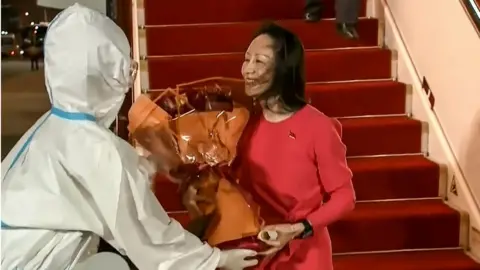 AFP via Getty Images
AFP via Getty ImagesSo when the US sought Ms Meng's extradition from Canada over alleged sanctions violations, it sent shockwaves through China, especially among its business elites.
A day before Mr Kovrig's return, a deal with US prosecutors allowed Ms Meng to leave Canada, and she returned home where, wearing a bright red dress, she received a hero's welcome.
"If faith has a colour, it must be Chinese red," she said.
Despite the sudden rapid conclusion of the years-long three-way diplomatic standoff, the fallout from the case is expected to reverberate for a long time - and analysts warn the way it ended sends a signal that China is willing to use tough tactics, including "hostage diplomacy" as it sees fit.
A tale of two detentions
It was 10 December, 2018 - nine days after Ms Meng was arrested in Vancouver - when two Canadians named Michael were suddenly arrested in China.
Mr Kovrig was a diplomat on leave, working in Beijing as the North East Asia Adviser for the International Crisis Group think-tank.
Mr Spavor was a businessman, a founding member of the Paektu Cultural Exchange, an organisation which facilitates international business and cultural ties with North Korea.
Not as much is known about Mr Spavor's time in detention in Dandong, near the North Korean border, but according to Mr Kovrig's wife, her husband, the diplomat, was kept in solitary confinement for six months in Beijing.
Detainees in China are interrogated for those first months for hours each day, usually while restrained, says Margaret McCuaig-Johnston, with the University of Ottawa and the University of Alberta's China Institute.
They both had limited opportunities to speak with consular officials or their families.
After those first months, Mr Kovrig was no longer kept in solitary but remained in conditions Ms Nadjibulla has said he described as "barren" and "monastic", with early morning wakeups and breakfasts of foods like boiled rice and vegetables.
He would stay active in the confined concrete cell, walking seven thousand steps a day. He spent time meditating and reading, she told the Crisis Group podcast.
Both were eventually tried behind closed doors in China. Mr Spavor was found guilty of spying and sentenced to 11 years in prison, while Mr Kovrig was awaiting a verdict when he was released last month.
 Handout Global Affairs Canada
Handout Global Affairs CanadaWhen the news came that they were coming home, the mood among Mr Kovrig's colleagues was euphoric, says Praveen Madhiraju, general counsel for his think-tank.
"I don't think I've ever cried at work before," he says. "But the week he was released there were tears everywhere around the organisation. Michael was always our colleague, even when he was detained."
Ms Meng's house arrest in Vancouver was quite different. She stayed in a mansion estimated to cost C$13m ($10m;£7.6m), could go out during the day, and was allowed visits from her husband and children, who were granted permission to enter Canada during the pandemic.
On court dates, her designer outfits frequently showed off her court-ordered ankle monitor.
The surprise deal
By the time her release came on 24 September, her legal case had been playing out publicly in Canada for three years, and a Canadian judge was soon due to announce whether the US extradition would be granted.
Huawei took on a parallel strategy of fighting the extradition in Canada on a legal basis while trying to find a political solution with the US government.
A senior Huawei executive was dispatched for months from the company's headquarters in Shenzhen to Washington to try and negotiate a release through behind the scenes meetings.
The firm argued that the case had become a problem for the US and China relationship (as well as with Canada) and that resolving it would be a positive step.
A breakthrough in the talks between the company and the US Department of Justice came this summer, two individuals close to the matter told the BBC.
US authorities claimed Huawei and Ms Meng misled the US government about the company's business in Iran, which is under US economic sanctions.
They were also pursuing criminal charges against both.
Huawei's bottom line was Ms Meng would not plead guilty, while the US insisted it would not drop any charges against the company. Both sides eventually agreed to let Ms Meng walk free, while the charges against the company itself remain in place.
Canada's ambassador to China,Dominic Barton, also spent three weeks in Washington last spring, according to reporting from the Globe and Mail newspaper, where he discussed the possibility of an agreement with Huawei that could lead to the release of Mr Kovrig and Mr Spavor.
In the end, the political solution won out, with Ms Meng pleading not guilty to her fraud charges, while admitting that information about the company was misrepresented in an effort to avoid certain US sanctions.
In turn, the US ended its request to have her extradited from Canada.
The release of the two Michaels
Meanwhile, family, friends, and colleagues of the two Michaels had lobbied fiercely for their release both publicly and privately since 2018.
Ms Nadjibulla was a "principal actor" in the work to free her husband Mr Kovrig and approached the advocacy with "skill and fervour", says Mr Madhiraju.
His colleagues helped press his case, including by raising it before the UN security council.
In detention, Mr Kovrig was allowed to request a few books and to send and receive the occasional letter, and staff tried to boost his morale by reading the same books and holding company challenges like plank endurance tests in solidarity.
He could hold "obscenely long planks, like I think 15 minutes," says Mr Madhiraju.
Mr Spavor's close family and friends also pressed his case and held a fundraiser to support him upon his release.
In a statement in early October, he said it was "humbling" to understand the continued support that they've both received from around the world.
"I'm appreciating being outside and the simple things around me," he added.
Canadian officials also put pressure on allies for support.
That eventually became a joint declaration, signed in February by some 60 nations, denouncing the practice of countries from detaining foreign citizens for diplomatic leverage.
The US has insisted that the two Michaels were not included as part of the agreement struck with Huawei.
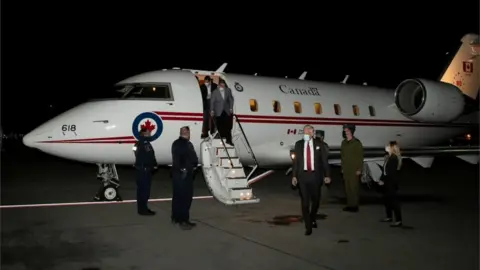 Reuters
ReutersCanada's ambassador to the US, Kirsten Hillman, has also said there was no "quid pro quo" when it came to their release.
But neither Canada nor the US made any secret of the fact they wanted the men home.
Their case was discussed between US President Joe Biden and Canadian Prime Minister Justin Trudeau on 2 August, as well as between Mr Biden and Chinese President Xi Jinping on 9 September.
President Xi "gave personal guidance" to resolve the dispute, the Chinese foreign ministry has said.
And then, within hours of Ms Meng's release, the two Michaels were on a plane back to Canada.
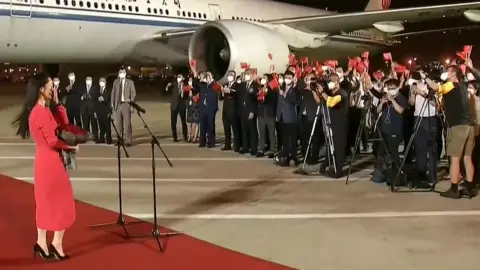 Getty Images
Getty Images"Nobody will admit to a deal. That is about face primarily," says Robert Daly, Director of the Wilson Center's Kissinger Institute on China and the US.
But he says: "Of course, there was a deal. You know, can I prove that? No. I've never been to the Arctic Ocean, but I'm pretty sure the water in the Arctic Ocean is cold and wet. Even though I've never felt it. Why? Because I'm not an idiot. And I know what the Arctic is. I know what oceans are. So clearly there was a deal."
For China, which had refuted claims they were being held in retribution for Ms Meng's arrest, the Michaels quick return seemed like a concession that there was indeed a link between the two cases.
The effect of this timing is "disturbing" as it is sending a message to every other country that China will use foreign citizens as leverage in diplomatic disputes, Ms McCuaig-Johnston says.
She was in Shanghai when the Michaels were arrested and was told by credible sources that Beijing kept a list of about 100 Canadians "they can pick up and interrogate at any time".
But political scientist Yves Tiberghien, from the University of British Columbia, was sceptical Beijing was trying to send a direct message.
"We know there was intense negotiations between the US and China, and that included negotiations in the phone call between [Mr Biden and Mr Xi]," he says.
He put their quick release down as a "result of diplomacy".
The lasting repercussions
The case has provoked anger in both China and Canada, says Mr Tiberghien.
Canadians were incensed and are questioning their country's approach to China. In China, the episode was seen as part of Western efforts to "stifle" Huawei and restrain its global ambitions.
Relations were so frosty that early on, there had ceased to be "any response" from Beijing on the matter, Ambassador Barton told parliament last year.
It was only at the G20 meeting in Osaka in June 2019 that Mr Trudeau, who was seated next to Mr Xi, was able to tell his counterpart: "We have to get through this", Mr Barton said.
Few analysts think that the deal could undo all the diplomatic damage or change the countries' assessment of their national interests.
The conclusion of Ms Meng's case did not end Washington's battle with Huawei, which remains on the US economic blacklist, sanctions that have had a major impact on its mobile phone business.
Huawei still faces racketeering and conspiracy to steal trade secrets charges - which it denies - from the US.
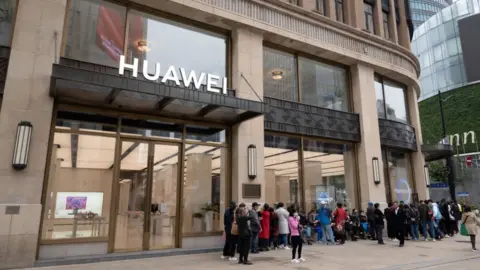 Getty Images
Getty ImagesThe US and UK have already moved to cut Huawei from their 5G mobile networks over national security concerns. Now, after dragging out Canada's own decision, Mr Trudeau has said one would be coming "in weeks".
Nor is the case entirely over for Ms Meng. She must comply with certain conditions, including not publicly contradicting the agreed statement of fact, until December 2022.
While the resolution of the case "has unclogged the day-to-day diplomacy" in Canada, this is all happening amid a wider shift in the global power structure with an ascendant Chinese economy and as the world needs to work together on major issues such as climate change, says Mr Tiberghien.
"We have to walk this very difficult line right now with China that is more assertive and more repressive but a fundamental partner for global issues."
Canadian public opinion has turned dramatically away from China because of the Michaels as well as the treatment of the Uyghurs. Issues like that suggest Canada-China relations have been irreparably damaged, says Ms McCuaig-Johnston.
It has drawn attention to other Canadians who remain detained in China, including Uyghur activist Huseyin Celil and Robert Schellenberg, who was sentenced to death for drug smuggling when Canada-China tensions were at their worst in the last few years.
In the short term, China would appear to be the winner of the deal, while the US gained little and Canada nothing at all, says Mr Daly.
"China gained a martyr and a talking point," he says.
Ms Meng's return became the focus of nationwide celebration in China, ramping up sentiment that she and Huawei are victims of America's "political persecution". Chinese state media said her homecoming showed "no power can stop China's advancing steps".
But it may turn out to be a pyrrhic victory in the long term, bringing to the fore concerns about China's hostage diplomacy.
"If the Chinese are honest and they do a post-mortem they will agree that this tarnished their image and the world has learned a lot in the last few weeks about what I refer as the 'dark side of China'," said Canada's former ambassador to Beijing, Guy Saint Jacques.
